
Company Thinks They Can Easily Replace This Worker When He Quits After Being Denied A Raise, Have A “Dark Epiphany” When Everything Starts Falling Apart
It’s a tale about an employee who was great at his job but quiet in his demeanor. This meant that he was seldom in line for a raise as he did not go to bat for himself.
When he finally worked up the courage to ask for more pay, the bosses, probably sensing his agreeable nature, said it wasn’t possible.
So the employee decided to find a place that actually valued him. He quietly packed his things and quit right then and there without saying a word.
It wasn’t until the parts he was responsible for needed replacing that the higher-ups noticed important company blueprints were also missing. And while the employee swore that he didn’t have them, one of his coworkers, Reddit user Solo1961, had the privilege of witnessing his departure and thinks otherwise.
This employee knew what he was worth, so when his bosses denied him a raise, he simply quit
Image credits: Syd Mills (not the actual photo)
But he also took vital company documents with him
Image credits: Thirdman (not the actual photo)
This ended up costing the company at least a few tens of thousands of dollars
Image credits: Solo1961
We managed to get in touch with the author of the post, Solo1961, and they were kind enough to tell us more about what happened then.
“[There were] two company owners. There was also a plant foreman (a business of about 20 employees). One boss was a decent guy. The other was arrogant and only interacted with his employees to admonish them about something,” the Redditor told Bored Panda.
They can’t remember if the company introduced any new policies after the whole ordeal, as quite some time has passed since then, but in hindsight, they still think about what John did and whether or not he took it too far.
“If I was the owner of the business, I would not have been happy. But these guys did not care about their employees,” they said.
“I suffered a workplace injury not too long after and they screwed me over on worker’s compensation. Did John cross the line? Personally, I don’t think he did. He should have been treated better. The company owners should have taken his request for a raise more seriously and tried to work something out. Looking back, years later with the eyes of a wiser man with more experience, John definitely deserved a raise.”
“The only final thing I can say is that I [also] got my revenge on the company years later for the way they handled my worker’s compensation. But that is another story.”
Currently, there are plenty of people like John, willing to make a career change. More than 4 million have left their jobs each month in the U.S. so far this year — and according to new research, this record-breaking trend is going to continue.
About 40% of workers are considering quitting their current jobs in the next 3-to-6 months, a report from McKinsey and Co. published earlier this month, which surveyed more than 13,000 people across the globe, including 6,294 Americans, between February and April, has found.
“This isn’t just a passing trend, or a pandemic-related change to the labor market,” Bonnie Dowling, one of the authors of the report, commented on the elevated quit rates. “There’s been a fundamental shift in workers’ mentality, and their willingness to prioritize other things in their life beyond whatever job they hold…We’re never going back to how things were in 2019.”
However, in an earlier Bored Panda interview, career and business coach Ben Fitzgerald said that, generally speaking, quitting your job on impulse isn’t a very good idea.
“While I’d love to say someone should quit their job if they’re simply not happy in it—anyone with a dependent, partner, or ferret to consider should ensure some kind of revenue stream is lined up to avoid becoming a dependent themselves,” Fitzgerald explained. “As the late, great Norm MacDonald once joked, the homeless dog can do that on their own.”
Fitzgerald specializes in career transitions and said working through your decisions with a trained listener who isn’t emotionally affected by your choices or biased from knowing you can be a good idea in these situations.
“However, if you choose a friend, make it clear at the start that you’d like them to simply listen. Not to offer advice or try to solve your problems. If you want their advice after getting everything off your chest, by all means, ask,” he added.
According to the career coach, some helpful questions to hear yourself talk through might be:
- What specific aspect(s) of my job are causing concerns or distress?
- Once the above is listed out, what are all the other ways I could address each of these concerns without quitting?
- If I do quit, what choices will I make to avoid feeling like I feel, somewhere else, in 6 months’ time?
But if you carefully work things through over, say, a few days’ time, and you’re still convinced that your job is the central reason why you’re feeling unhealthy, unfulfilled, and/or unhappy, then Fitzgerald suggests putting together a plan.
“As exciting as it may be to quit a job, you don’t want to do it on the spot,” he said. “It’s best to have a plan in place for what comes next. What that plan looks like is far too personal to outline because it has to do with the marketability of your skills, your risk appetite, financial situation, the list goes on.”
People were glad to hear the employee stood up for himself
More importantly, why weren't the owners taking the blueprints John had and updating them to match the changes John made. This is on them. As experienced design engineers, they had to know there were changes made. They should have had a process to capture and document those changes to keep their blueprints up to date. They own the business. It's their responsibility to make sure they have the proper processes in place to make it work. Also the blueprints they provided John evidently were not correct. The we're getting "design for manufacturing" work out of John and I'll bet a dollar to a donut that they weren't paying him for that. At any time they could have come to John to get those changes and incorporate them into the master drawing. So from where I'm sitting, they were cool with letting John do all work for free and only cared when it became a problem.
Only a crime if they can prove he took the blueprints. If he was smart he would have destroyed them so their disappearance could never be tied to him.
Or all this a moot point. Most machinists do not have IP contracts... Never even heard of one to be honest... Those blueys were his. Period. By law.
Load More Replies...More importantly, why weren't the owners taking the blueprints John had and updating them to match the changes John made. This is on them. As experienced design engineers, they had to know there were changes made. They should have had a process to capture and document those changes to keep their blueprints up to date. They own the business. It's their responsibility to make sure they have the proper processes in place to make it work. Also the blueprints they provided John evidently were not correct. The we're getting "design for manufacturing" work out of John and I'll bet a dollar to a donut that they weren't paying him for that. At any time they could have come to John to get those changes and incorporate them into the master drawing. So from where I'm sitting, they were cool with letting John do all work for free and only cared when it became a problem.
Only a crime if they can prove he took the blueprints. If he was smart he would have destroyed them so their disappearance could never be tied to him.
Or all this a moot point. Most machinists do not have IP contracts... Never even heard of one to be honest... Those blueys were his. Period. By law.
Load More Replies...

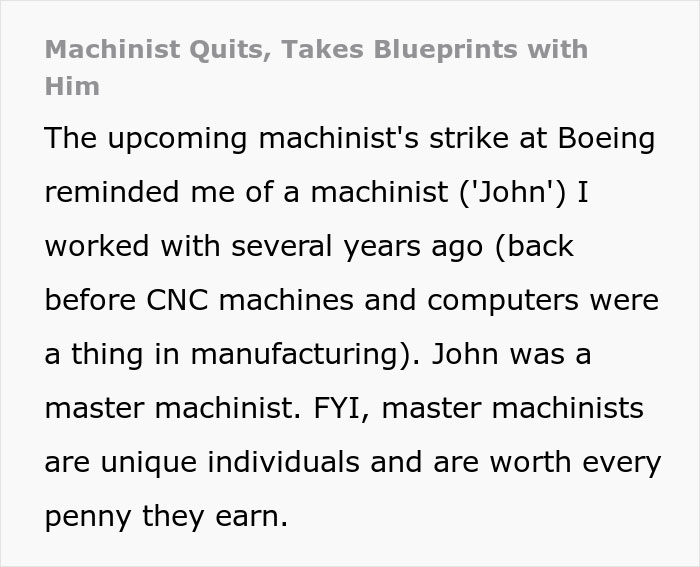


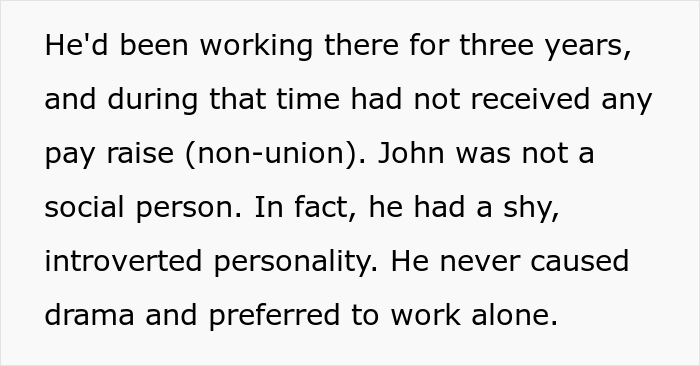
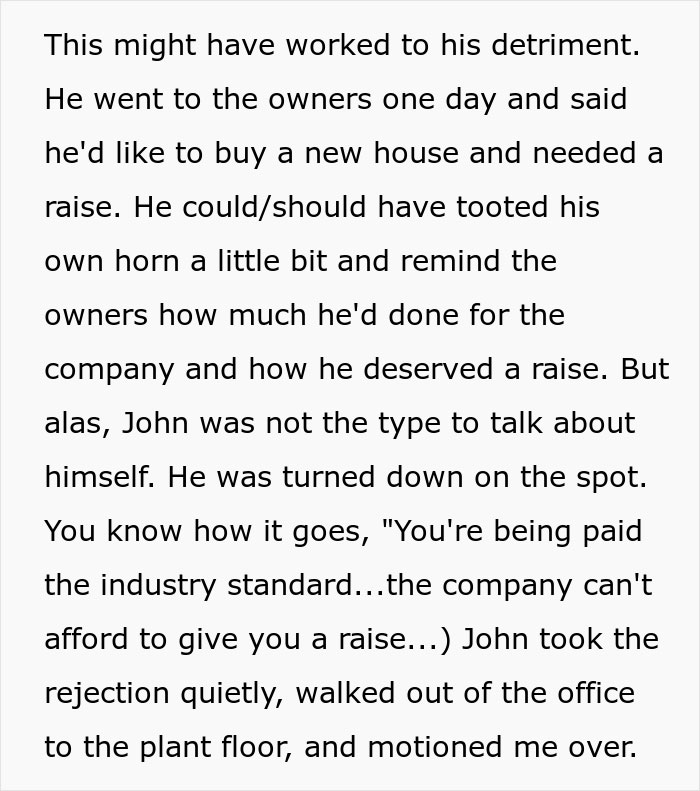

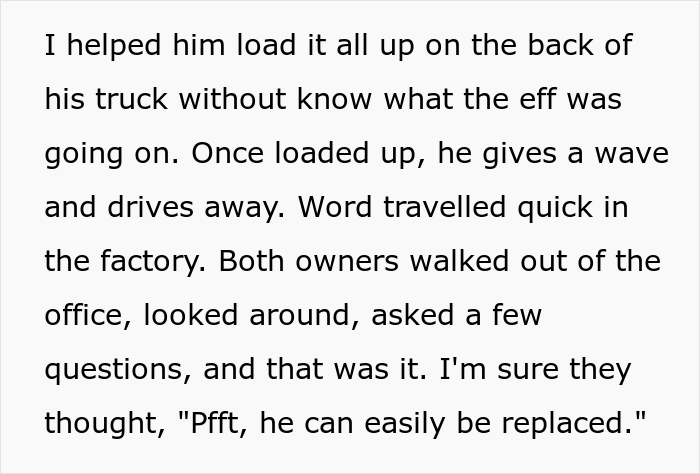

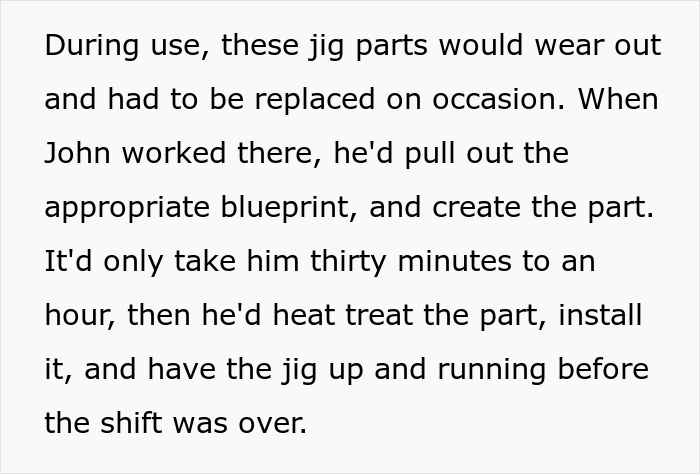
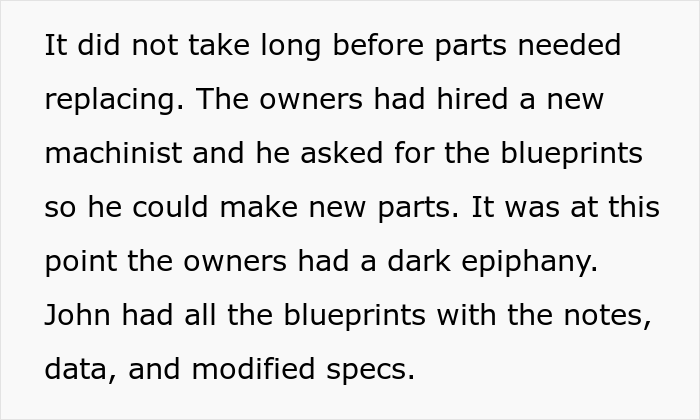

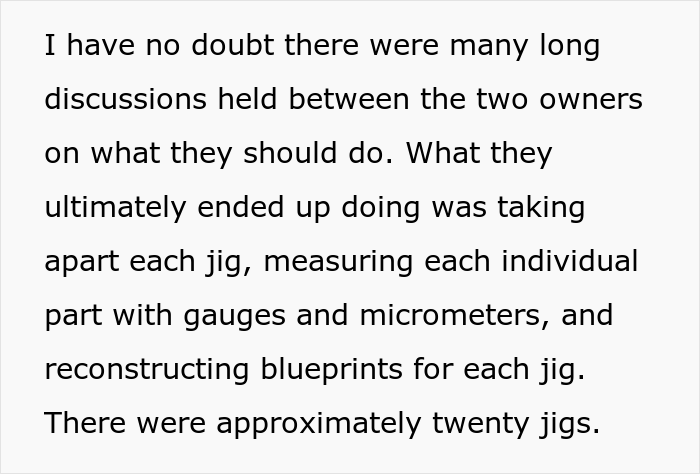
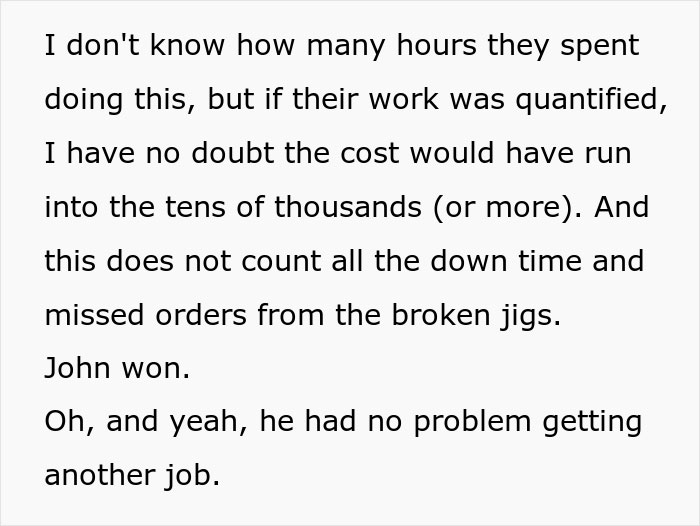

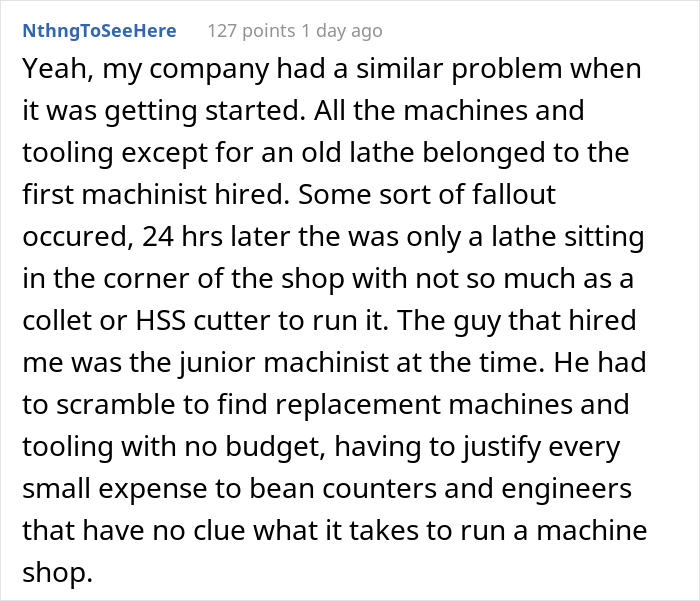

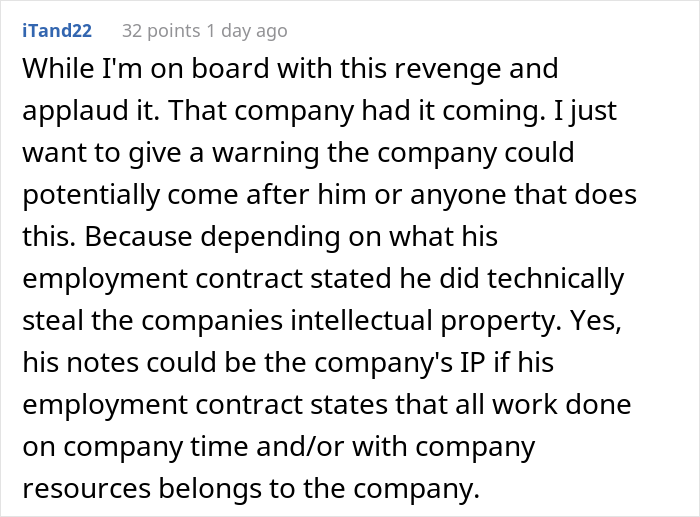





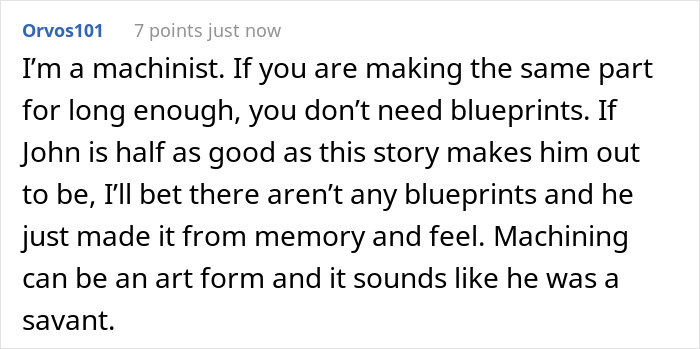





80
14